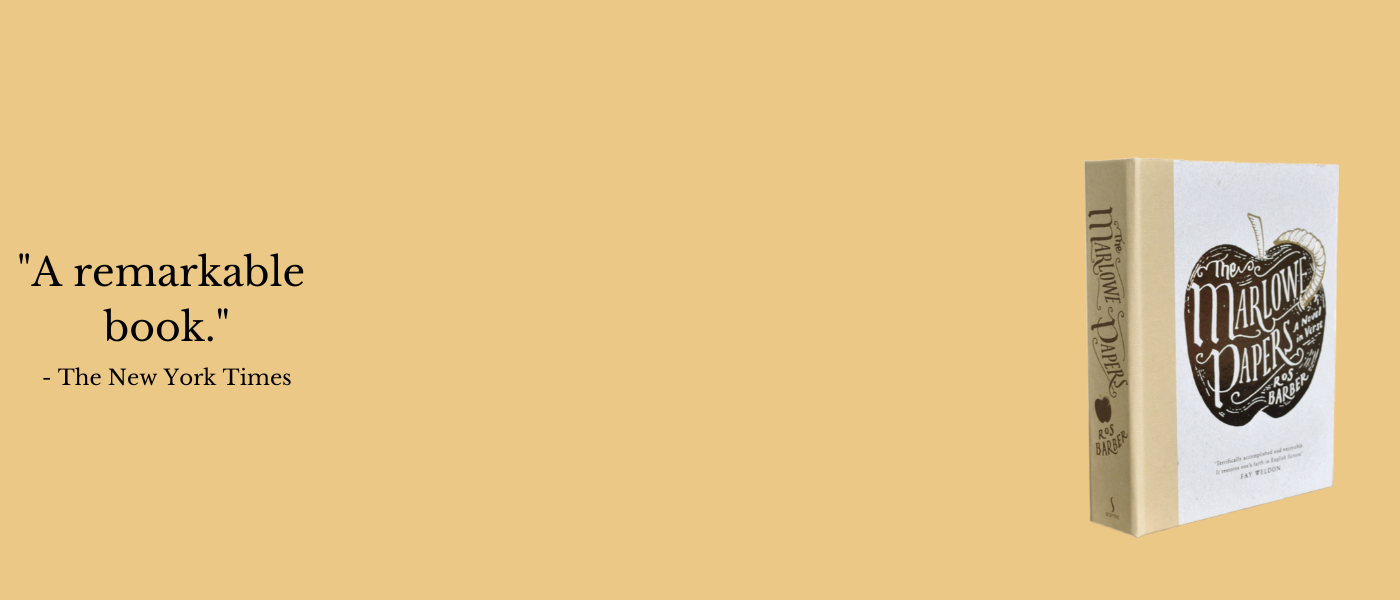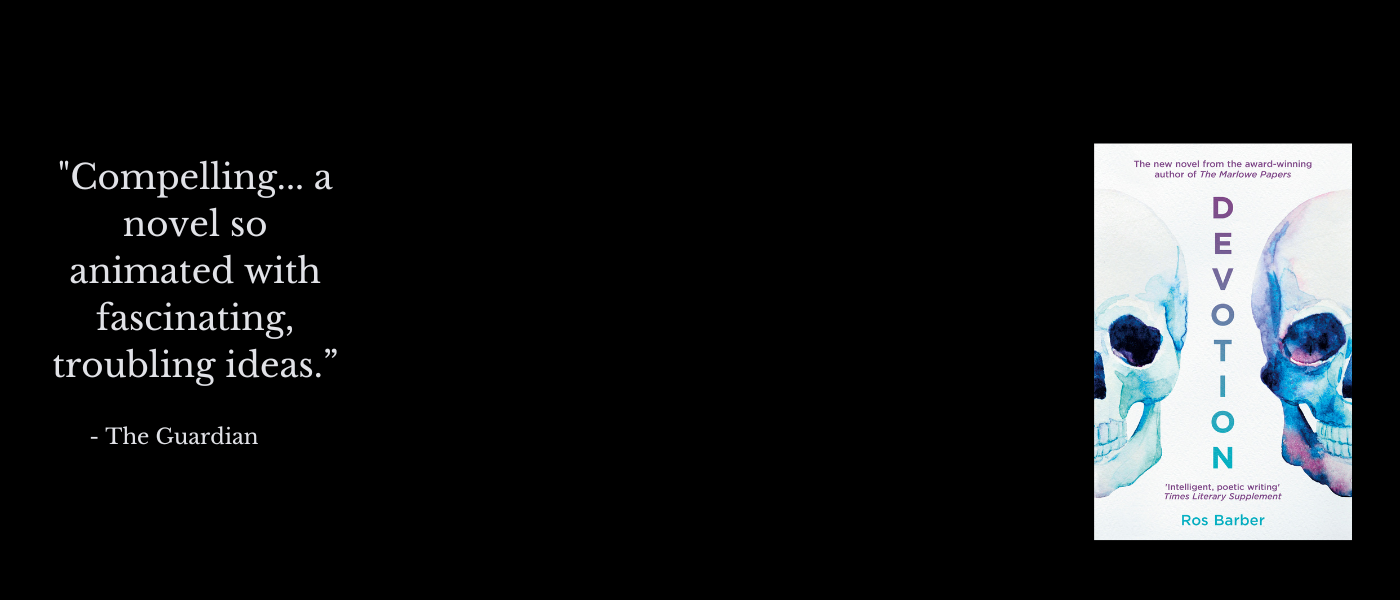Here’s a copy of the bound proof of The Marlowe Papers on my writing desk at the end of 2011. At the beginning of 2011 there was no inkling that such a thing was likely to exist. The novel in verse had been written and the four friends to whom I’d given typescripts had all come back saying it was amazing, but then friends generally say that. That’s why they’re friends. My agent (of a decades standing) had said it was ‘a real treat’ and like nothing she’d ever read before. That phrase set the fuel-light blinking. If you know anything about publishing, you’ll recognise that being like nothing an agent has ever read before isn’t necessarily a Good Thing. If something is not like anything else, it doesn’t fit into a comfortable marketing pigeon hole. You can’t tell people it’s The Next [Insert Successful Author/Book Here]. And my patient agent knew very well (having submitted, and oh-so-nearly-sold three previous prose novels of mine) that I am very good at writing things that editors think are wonderful but the marketing people can’t work out how to market.
Some weeks had gone by and I’d twice e-mailed my agent with ideas of editors who might, nevertheless, be interested in taking a glance at it. No response. This was the engine cutting out and the vehicle coasting to a stop on the hard shoulder. Agents, I’m told, never ‘sack’ their authors. They just ignore them until they go away. So there I was with four-years’ worth of passion-project in my lap and no way forward. How did I turn things around so spectacularly?
Simply speaking, I changed my mind.
I have come to understand that the world reflects back to us what we are thinking/feeling, and what we expect. I have tested it repeatedly and found it to be true. You’ll probably have experienced it yourself on some level or other.
If you go into a party, for example, feeling nervous and worried that you won’t pass muster, people tend to pick up on it. Your nervousness means you commit a faux pas, get someone’s name wrong, over-laugh when someone makes a joke, drink too much to steady your nerves, speak out of turn, generally start looking like a bit of a tit. You’ll make several bad impressions and go home to torture yourself few a few days (weeks or month in some cases); it all panned out just as you feared. Maybe worse.
But walk into the same party feeling good about yourself, happy and confident. People pick up on this, too, and respond to this positive you very differently. This feeds your confidence further and conversations flow smoothly. Your timing is spot-on. The more successful you feel, the more people treat you as a successful person. They want to be associated with you. They make you offers. And you get invited to other parties.
Our minds are considerably more powerful then most people credit. The electro-magnetic waves of both heart and brain can be measured at distance with sensitive-enough equipment (and other sentient beings are certainly that). Our thoughts and feelings do not recognise the boundaries of our skulls; they are transmitted outward, and picked up on by others. Anyone who has done a few poetry readings will know you can ‘read’ the energy of a room; read whether it is warm and friendly or flat and cold: the combined effect of the thoughts and feelings of all those present. Just as you can feel eyes on the back of your head, turn round and pinpoint the starer with great accuracy, you can “feel” a person’s positive or negative expectations.
And if someone (let’s say, for point of argument, an author) has negative expectations, even though they are verbally expressing the most hopeful and positive language, others (including agents and publishers) will *feel* those expectations. And you know how it is when someone has the whiff of failure about them (even the expectation of failure). Another human, picking up that whiff, will conclude there must be good reason for it, and steer clear. As dogs are with smells, so human beings are with brainwaves.
My big issue was “being overlooked”. All my writing life I’d been runner-up, highly commended, bridesmaid-not-bride. I had numerous tales to tell of my near-misses. Being overlooked was both my most common professional experience and my greatest fear. Becoming conscious of this was key to changing it; and change it I would have to, if The Marlowe Papers was going to see the light of day in book form. I realised I was transmitting “I will be overlooked” very loudly, and (as always) the universe was obliging. Once upon a time changing a belief like “I am always overlooked” (which I rated as 100% true) would be so tough as to be impossible, but in recent years, brilliant tools for reprogramming the mind have emerged, and the one I have found the most powerful is EFT (Emotional Freedom Technique, sometimes called ‘tapping’).
Working on it in daily half-hour sessions over a week or so, I found “I am always overlooked” was programmed into me (as so many things are) during early childhood. My parents divorced when I was rather young, and were too involved in their own dramas to pay much attention to me at certain times. Memories that arose (things I had long buried) included my Mum forgetting to pick me up after a drama lesson (age 9) or crying alone in the garden (age 6) after the cattery ‘lost’ our cat. These would have seemed relatively unimportant things to adults going through a marriage breakup, but to a child, they were huge, and they taught me (along with around a dozen other incidents) “I am always overlooked”. This the message I had been transmitting to others all my adult life. And just the first of several limiting beliefs that had held my writing career permanently in the starting blocks.
A week or so after I’d started clearing this belief I went to someone else’s book launch and – it made me laugh – I’ve never had so much recognition in my life. A stranger in front of me turned around and said “You’re Ros Barber and you wrote the Embassy Court poems. I love those poems”. At the bar someone else I failed to recognise (an editor) reminded me we had met years previously and then recounted to me the name, year, and first line of a poem that was Highly Commended in the 1986 National Poetry competition. And two more people came up to prove conclusively that I was no longer the person that was overlooked.
I changed not just this, but everything about my mindset that was keeping success at bay. With EFT, I was able to do it faster than you can probably imagine. And then … and only then… I found a new agent. Whether you think that coincidence will be entirely dependent on your worldview, of course. I know what I think.


